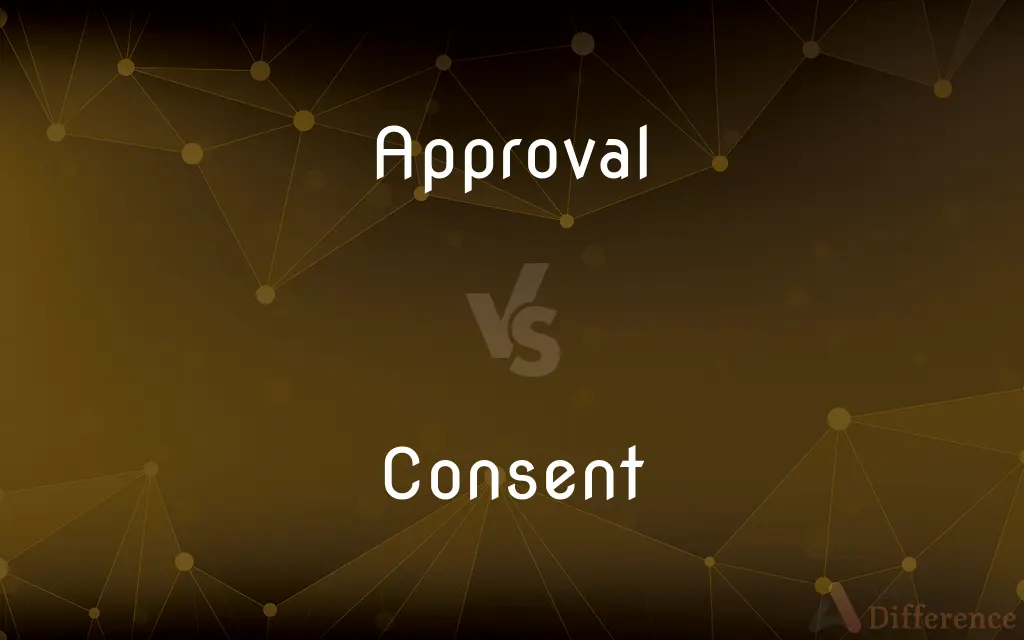Approval vs. Consent — What's the Difference?
Edited by Tayyaba Rehman — By Fiza Rafique — Updated on October 30, 2023
Approval is an agreement or favorable opinion. Consent is a voluntary agreement or permission. Both involve agreement, but context may differ.

Difference Between Approval and Consent
Table of Contents
ADVERTISEMENT
Key Differences
"Approval" typically denotes an agreement or a favorable opinion towards something. For instance, when one seeks "approval" for a project, they are essentially seeking validation or a positive nod for their plans. In many situations, "approval" is sought from higher authorities or those in positions of power to ensure that a particular action or decision is sanctioned or permitted.
On the other hand, "Consent" is rooted in the notion of voluntary agreement or permission. When one gives their "consent," they are giving their explicit permission or agreement, often after understanding the implications fully. In many contexts, especially legal and medical, "consent" is paramount, ensuring that individuals are making informed and voluntary decisions.
Furthermore, while both words revolve around the concept of agreement, "approval" often leans towards endorsement or validation, implying a degree of judgment. For instance, getting an "approval" on a loan suggests that the bank has assessed and deemed you fit for the loan. In contrast, "consent" is about personal agency and choice, such as consenting to a medical procedure after understanding its risks.
Another aspect to consider is the power dynamic. Often, "approval" is sought from those in authority or positions of judgment, like seeking managerial "approval" for a leave request. Conversely, "consent" emphasizes equality in the decision-making process, ensuring all parties involved are in agreement.
To sum it up, while both "approval" and "consent" involve forms of agreement, they differ in their nuances, implications, and the contexts in which they are most aptly used.
ADVERTISEMENT
Comparison Chart
Basic Meaning
Agreement or favorable opinion.
Voluntary agreement or permission.
Common Contexts
Professional, bureaucratic settings.
Legal, medical, personal decisions.
Nuance
Involves endorsement or validation.
Emphasizes personal agency and choice.
Power Dynamics
Often from a higher authority.
Emphasizes equality in decision-making.
Implications
Judgment or assessment involved.
Focus on informed and voluntary decisions.
Compare with Definitions
Approval
A favorable judgment.
The design met with widespread approval.
Consent
Agreement in sentiment or opinion.
The decision was made with mutual consent.
Approval
Sanction or endorsement.
The project received the boss's approval.
Consent
Compliance or approval.
She nodded in consent.
Approval
Acceptance or liking.
The novel found approval among critics.
Consent
Voluntary permission or agreement.
She gave her consent for the surgery.
Approval
The act or an instance of approving.
Consent
Legal permission.
Minors cannot give consent without parental involvement.
Approval
An official approbation; a sanction.
Consent
Approval of what is done by another.
He acted without the community's consent.
Approval
Favorable regard; commendation.
Consent
Consent occurs when one person voluntarily agrees to the proposal or desires of another. It is a term of common speech, with specific definitions as used in such fields as the law, medicine, research, and sexual relationships.
Approval
An expression granting permission; an indication of agreement with a proposal; an acknowledgement that a person, thing, or event meets requirements.
I need to get an approval on this purchase order.
Consent
Permission for something to happen or agreement to do something
No change may be made without the consent of all the partners
Approval
An expression of favorable acceptance and encouragement; a compliment that also condones.
Words of approval never seem to come from him.
Consent
Give permission for something to happen
He consented to a search by a detective
Approval
Something mailed by a seller to a collector to match their stated interests; the collector can approve of or return the item.
Consent
To give assent, as to the proposal of another; agree
Consent to medical treatment.
Consent to going on a business trip.
Consent to see someone on short notice.
Approval
Approbation; sanction.
A censor . . . without whose approval n capital sentences are to be executed.
Consent
(Archaic) To be of the same mind or opinion.
Approval
The formal act of giving approval;
He gave the project his blessing
His decision merited the approval of any sensible person
Consent
Acceptance or approval of what is planned or done by another; acquiescence.
Approval
A feeling of liking something or someone good;
Although she fussed at them, she secretly viewed all her children with approval
Consent
Agreement as to opinion or a course of action
She was chosen by common consent to speak for the group.
Approval
Acceptance as satisfactory;
He bought it on approval
Consent
(intransitive) To express willingness, to give permission.
After reflecting a little bit, I've decided to consent.
Approval
A message expressing a favorable opinion;
Words of approval seldom passed his lips
Consent
To cause to sign a consent form.
Approval
The act of approving.
The document awaits approval.
Consent
To grant; to allow; to assent to.
Approval
Official permission.
You need approval before proceeding.
Consent
To agree in opinion or sentiment; to be of the same mind; to accord; to concur.
Consent
Voluntary agreement or permission.
Consent
(obsolete) Unity or agreement of opinion, sentiment, or inclination.
Consent
(obsolete) Advice; counsel.
Consent
To agree in opinion or sentiment; to be of the same mind; to accord; to concur.
And Saul was consenting unto his death.
Flourishing many years before Wyclif, and much consenting with him in jugdment.
Consent
To indicate or express a willingness; to yield to guidance, persuasion, or necessity; to give assent or approval; to comply.
My poverty, but not my will, consents.
And whispering "I will ne'er consent," - consented.
Consent
To grant; to allow; to assent to; to admit.
Interpreters . . . will not consent it to be a true story.
Consent
Agreement in opinion or sentiment; the being of one mind; accord.
All with one consent began to make excuse.
They fell together all, as by consent.
Consent
Correspondence in parts, qualities, or operations; agreement; harmony; coherence.
The melodious consent of the birds.
Such is the world's great harmony that springsFrom union, order, full consent of things.
Consent
Voluntary accordance with, or concurrence in, what is done or proposed by another; acquiescence; compliance; approval; permission.
Thou wert possessed of David's throneBy free consent of all.
Consent
Capable, deliberate, and voluntary assent or agreement to, or concurrence in, some act or purpose, implying physical and mental power and free action.
Consent
Sympathy. See Sympathy, 4.
Consent
Permission to do something;
He indicated his consent
Consent
Give an affirmative reply to; respond favorably to;
I cannot accept your invitation
I go for this resolution
Common Curiosities
Are "Approval" and "Consent" interchangeable?
Not always. Context matters. "Approval" implies endorsement, while "Consent" means voluntary agreement.
Can I use "Approval" to mean liking something?
Yes, "Approval" can also denote a favorable opinion or liking.
Is "Approval" always from an authority figure?
Often, but not always. It can also mean general acceptance or liking.
What's the importance of "Consent" in medical procedures?
It ensures patients make informed, voluntary decisions about their health.
Can "Consent" imply a legal agreement?
Yes, "Consent" often has legal implications, especially in medical or legal contexts.
Is "Consent" only about giving permission?
Primarily, but it also emphasizes the informed and voluntary nature of the agreement.
Can someone give "Consent" without fully understanding the implications?
Ideally, no. "Consent" should be informed and understood.
In which scenarios is "Consent" paramount?
Especially in legal, medical, and personal decisions where agency is crucial.
Do all decisions require "Approval"?
Not all, but certain decisions, especially in formal settings, may require it.
Is "Approval" always a positive thing?
Generally, it denotes a favorable opinion, but context matters.
Can "Consent" be implicit?
Ideally, consent should be explicit, but there are scenarios where it's implicitly understood.
Who typically gives "Approval"?
Often those in positions of authority or judgment, but context varies.
Which term, "Approval" or "Consent", implies judgment?
"Approval" often implies judgment or assessment.
Does "Approval" mean something is finalized?
Not necessarily. It can be a step in a process.
Can "Consent" be withdrawn?
Yes, especially if the circumstances change or if new information is presented.
Share Your Discovery

Previous Comparison
Duet vs. Duo
Next Comparison
Nonpunitive vs. PunitiveAuthor Spotlight
Written by
Fiza RafiqueFiza Rafique is a skilled content writer at AskDifference.com, where she meticulously refines and enhances written pieces. Drawing from her vast editorial expertise, Fiza ensures clarity, accuracy, and precision in every article. Passionate about language, she continually seeks to elevate the quality of content for readers worldwide.
Edited by
Tayyaba RehmanTayyaba Rehman is a distinguished writer, currently serving as a primary contributor to askdifference.com. As a researcher in semantics and etymology, Tayyaba's passion for the complexity of languages and their distinctions has found a perfect home on the platform. Tayyaba delves into the intricacies of language, distinguishing between commonly confused words and phrases, thereby providing clarity for readers worldwide.















































